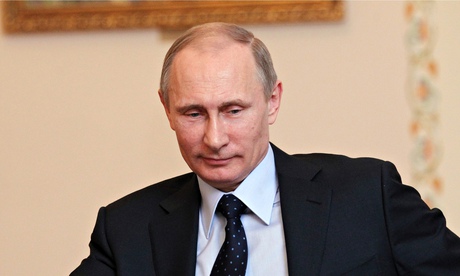Ukraine crisis: any EU sanctions are unlikely to make impression on Putin

Analysts say that
Vladimir Putin (pictured) has already factored in the possible response
to his Crimean landgrab and decided it was worth it. Photograph: Sasha
Mordovets/Getty Images
A crisis that started with an EU summit fiasco three months ago may climax on Thursday with an EU summit failure as Putin's short-term hard power collides with European longer-term soft power and leaves the EU looking weak and feckless.
The Italians and the French do not want to punish Putin. The Swedes and the east Europeans take a hard line. The British government is worried about the impact on the City of London and losing big-spending oligarchs in west London. German industry is lobbying strongly against imposing sanctions on Russia.
And while Washington talks of isolating Russia because of Ukraine, Berlin is saying the opposite, stressing engagement and keeping channels open to the Kremlin.
The lack of transatlantic consensus will make for a difficult summit at what analysts say may be a defining moment in European foreign policymaking.
"It's a crucial litmus test for European foreign policy," said Jan Techau, director of the Carnegie Europe thinktank in Brussels.
While Barack Obama has threatened to isolate Russia "politically, diplomatically, economically", there is little stomach in Europe for such drastic action that could backfire badly on their own economies.
And the US pressure is unlikely to have much impact without European support. EU trade with Russia is more than 11 times the level of America's. And in the EU, Germany is by far the most important player, trading at a level more than three times its nearest rival, Italy. Germany is also the biggest single consumer of Russian gas, taking a quarter of its exports.
It appears less keen to punish Putin than to keep channels open to him. The pivotal player at Thursday's meeting will be Germany's chancellor, Angela Merkel.
"You always have these US-European differences," said a former senior EU foreign policy strategist. "Engagement will not end because Europe is not in a position to isolate Russia. But you can talk to it differently, and Merkel's rather good at that."
The sanctions being discussed appear weak and are unlikely to make much of an impression on Putin. They include freezing EU-Russia negotiations on visa liberalisation and a new agreement governing EU-Russia relations.
Russia's ambassador in Brussels, Yevgeniy Chizhov, said they were all bark and no bite, merely a confirmation of the status quo because both sets of talks were already effectively frozen.
"They do not appear to be overly impressive. I would even add that they are more restrained than the political rhetoric that surrounded them," he told the EurActiv website. "Because the process is already frozen by the EU. It's not going anywhere."
Analysts say that Putin has already factored in the possible response to his Crimean landgrab and decided it was worth it. Besides, sanctions are a two-way street. There are more than 6,000 German firms working in Russia, for example. An assets freeze on selected members of the Russian elite will also hurt European banks.
Chizhov pointed out that EU-Russia trade is worth €1bn (£820m) a day. "That is a figure worth considering before taking any restrictive measures," he warned. "It's not a threat, rather a piece of friendly advice. If we speak about trade and economic ties, it's always a two-way street."
The EU has played a central role in the Ukraine crisis. It erupted in November at a special EU summit in Lithuania when the president, Viktor Yanukovych, turned his back on years of negotiations with Brussels and secured instead a financial bailout from Putin and aligned Ukraine with Russia, triggering the pro-EU street protests that eventually brought him down. The onus is on Europe to respond. But it is ill-equipped to do so quickly and effectively.
"Whatever they decide, will it matter at all?" asked Techau. "The instruments in the toolbox are just not strong enough to make a difference. The Russians are there and no one can kick them out. We can't change the status quo."
If Germany is the key player, it has a long postwar pedigree of Ostpolitik, preferring engagement and dialogue to confrontation, especially with Russia – a position that has angered the east Europeans who complain European foreign policy is being driven by German economic interests.
Putin got away unpunished with a similar campaign in Georgia in 2008. The Russians still occupy 20% of that country. And in the runup to the brief war, Merkel resisted US pressure for giving Georgia Nato membership prospects for fear of angering Moscow.
Analysts and diplomats say the Ostpolitik tradition remains strong but that Berlin is shifting and the Ukrainian crisis is likely to hasten the change.
"Putin's a loser and he's just lost Ukraine," said the former senior EU diplomat. "Putin has just decided this question for us. We need to reinforce his mistake. The best way to do that is not sanctions on Russia. The most important thing is helping Ukraine. The best way to take revenge."

No comments:
Post a Comment